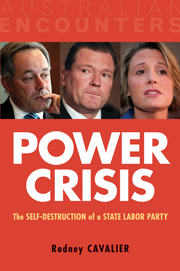Book contents
- Frontmatter
- Contents
- Australian Encounters with the ALP
- Preface
- Acknowledgements
- Introduction
- 1 NSW Labor and its leaders
- 2 Death below
- 3 The rise of Morris Iemma
- 4 Annual Conference, May 2008
- 5 Morris Iemma falls
- 6 The protracted fall of Nathan Rees
- Epilogue: Does party membership matter?
- Appendix A NSW ALP branches closed 1999–2009
- Appendix B NSW ALP financial membership 2002–09
- Appendix C Delegates to NSW ALP Annual Conference, May 2008
- Sources
- Index
- Australian Encounters series
- Forthcoming titles in the Australian Encounters series
4 - Annual Conference, May 2008
Published online by Cambridge University Press: 10 January 2011
- Frontmatter
- Contents
- Australian Encounters with the ALP
- Preface
- Acknowledgements
- Introduction
- 1 NSW Labor and its leaders
- 2 Death below
- 3 The rise of Morris Iemma
- 4 Annual Conference, May 2008
- 5 Morris Iemma falls
- 6 The protracted fall of Nathan Rees
- Epilogue: Does party membership matter?
- Appendix A NSW ALP branches closed 1999–2009
- Appendix B NSW ALP financial membership 2002–09
- Appendix C Delegates to NSW ALP Annual Conference, May 2008
- Sources
- Index
- Australian Encounters series
- Forthcoming titles in the Australian Encounters series
Summary
Critics of ALP Conferences are correct that modern governments cannot have a mere thousand people issuing instructions to an elected government. These critics of union control and conference sovereignty found their voices so very late. Those who denounced the unions exercising their formal voting strength on the floor of Conference were a galaxy of those who had benefited from the union bloc vote throughout their careers. Bob Carr, Barrie Unsworth and Paul Keating were vocal that unions were not entitled to dictate to an elected government. In set-piece offerings they denied the legitimacy of a conference decision that was adverse to the wishes of the government. None of these former leaders had been shy about demanding the support of the bloc vote to back in their enterprises in times past.
It was fine and good for unions to have untrammelled power on the floor of Conference when they delivered what governments wanted; it was an outrage when unions were in earnest about matters inconvenient to government. Bob Carr had not wavered in his support for union bloc control of the ALP Conference during his 17 years as party leader. A handful of union officials had always delivered what he wanted – bar electricity privatisation. Persuading the representatives of the party membership was a less certain, more demanding affair. The membership had to cop whatever an inner group of Right union officials found acceptable.
- Type
- Chapter
- Information
- Power CrisisThe Self-Destruction of a State Labor Party, pp. 90 - 118Publisher: Cambridge University PressPrint publication year: 2010



